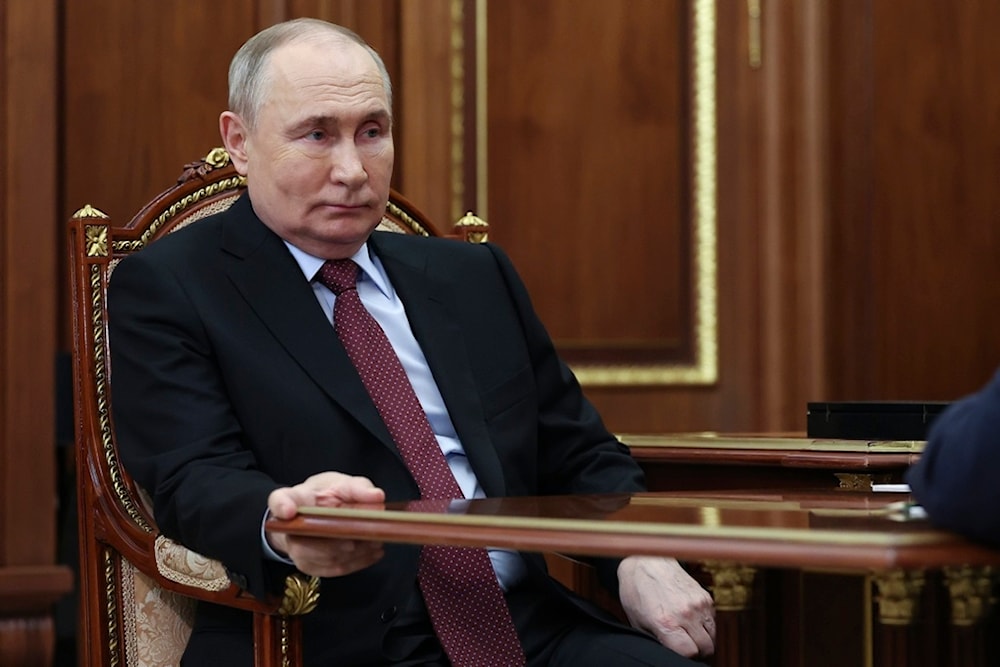Russian economy immune to sanctions: The Economist
Positive economic indicators could bolster Russian President Vladimir Putin's position as Russia's presidential election approaches.
-

Russian President Vladimir Putin listens to Head of Russian State Space Corporation Roscosmos Yuri Borisov during their meeting at the Kremlin in Moscow, Russia, Monday, March 11, 2024 (AP)
An op-ed by The Economist on Monday detailed the economic trajectory of Russia in the two years since the start of the war in Ukraine, stating that despite initial fears of a financial collapse in 2022, the Russian economy has continuously defied pessimistic forecasts.
Instead of facing a catastrophic downturn, the economy experienced a recession of lesser severity and shorter duration than anticipated. Moreover, while inflation emerged as a recent concern, even prompting worries from Putin himself, recent data suggests a potential stabilization in prices.
Overall, data suggests that the Russian economy is rebounding once again. A report expected to be published on March 13th indicates a decrease in monthly inflation in February compared to the end of the previous year. Year-on-year inflation rates are projected to stabilize, with forecasts suggesting a potential decrease to just 4%.
According to the report, these figures could bolster Putin's position as Russia's presidential election, set to begin on March 15th, approaches.
Last year, Russian inflation surged due to increased government spending on various sectors amid the war in Ukraine. The fiscal splurge led to heightened demand for goods and services, resulting in price increases.
The labor market also faced challenges, with shortages exacerbated by military conscriptions and emigration.
Read more: Venezuela increasingly becoming immune to US sanctions
Two entities claim credit for the economic turnaround. The finance ministry touts exchange-rate controls, while the central bank emphasizes its policy of significantly raising interest rates since July 2023, which has encouraged saving and curbed lending.
Despite tough measures, Russia appears to be heading for a "soft landing," where inflation slows without severely impacting the economy. GDP growth remains positive, unemployment is low, and corporate distress is minimal. The Moscow Exchange anticipates increased initial public offerings this year, reflecting investor confidence.
Russia's economic resilience is partly attributed to past stimulus efforts, with corporations and households maintaining large cash reserves. Sanctions evasion has further boosted the economy, as companies have adapted supply chains and established new trading relationships, particularly with China.
However, concerns persist regarding inflation expectations and potential economic vulnerabilities, such as currency depreciation and fluctuating oil prices. Nonetheless, Russia's economy appears to be on a path to recovery once again.
Global Shift Away from Dollar Dominance
The war in Ukraine, now entering its second year, has not only brought to light the ineffectiveness of Western sanctions against Russia but has also backfired on European countries that relied heavily on Russian gas.
Russia's resilience against sanctions suggests that a rapid shift to a multipolar world is in the making, especially considering that the BRICS organization has recently come to include new members, including a key US ally, Saudi Arabia.
As de-dollarization gains momentum, questions arise about the future of US economic hegemony and its implications for global economic dynamics. Discussions about the creation of an alternative financial market and reserve currency have been rapidly gaining traction recently.
Read more: US economy 'too strong' for sanctions to undermine dollar: Treasury
In a desperate attempt to try to contain Russia, the US recently introduced 500 sanctions targeting individuals and entities allegedly affiliated with Russia over the war in Ukraine. They were introduced as a result of Russian opposition politician Alexei Navalny who died on February 16.
The US blamed Russia for Navalny's death despite the fact that no evidence pointed to it. On the day of his death, US officials announced they would discuss a possible response with their allies, leading many to believe that Washington was possibly behind Navalny's death.
This also comes against the backdrop of the recent defeat of Ukrainian forces in the city of Avdiivka, which fell under Russian control, an event that highly frustrated Western countries. The fall of the Ukrainian city coupled with Russia's economic resilience has indeed driven Western leaders crazy. Even more concerning is the reality that Russia has emerged as an example for other nations in how to resist US sanctions.
The West is currently mulling unlocking frozen Russian assets to fund the war in Ukraine. The IMF warned that doing so could significantly impact the global monetary system and entail unforeseen risks.

 4 Min Read
4 Min Read










